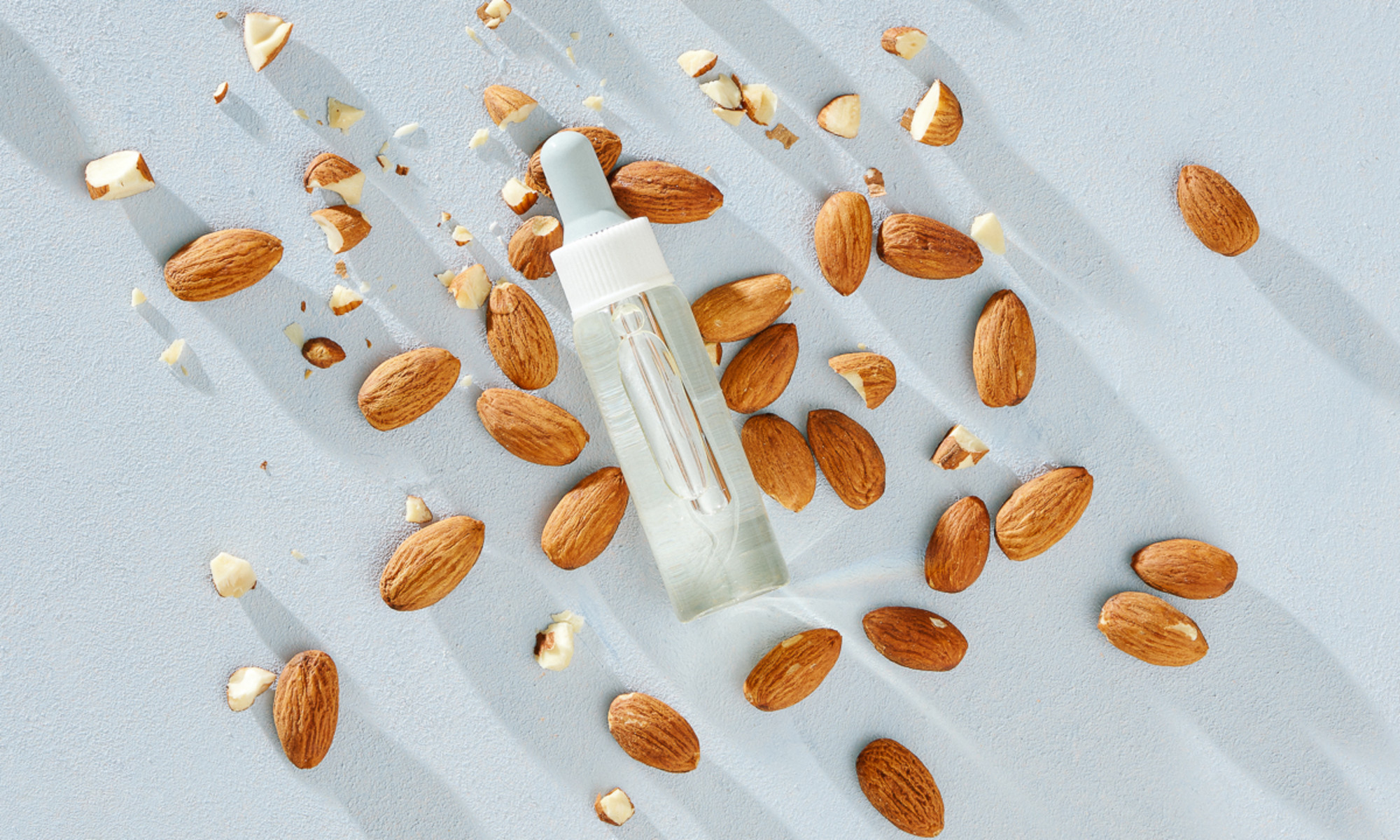Have Aging Skin, Sun Damage, Or Scars? Try This Underrated Oil
Every so often there comes a trendy natural oil that piques the beauty community's interest.


mbg Assistant Beauty Editor
mbg Assistant Beauty Editor
Hannah Frye is the Assistant Beauty Editor at mindbodygreen. She has a B.S. in journalism and a minor in women’s, gender, and queer studies from California Polytechnic State University, San Luis Obispo. Hannah has written across lifestyle sections including health, wellness, sustainability, personal development, and more.
Image by Marc Tran / Stocksy May 11, 2023 Every so often there comes a trendy natural oil that piques the beauty community's interest. Coconut oil was in the spotlight for a long time; argan and jojoba, too. Almond oil, with its silky slip and skin-nurturing properties, is poised to be another favorite. But how much do you know about the kitchen staple—and what does it actually do for the skin? We spoke with some dermatologists and dove into the research to find out
Advertisement
This ad is displayed using third party content and we do not control its accessibility features.
What is almond oil?
The name speaks for itself: Almond oil comes from almonds. Historically, this nutrient-dense oil has been used by Ancient Chinese, Ayurvedic, Greek, and Persian schools of medicine to treat dry skin1.
Structurally, almond oil is practically made for dry skin. It contains a high level of fatty acids that can improve the barrier function of skin, and it also contains vitamins D and E so it works as an anti-inflammatory, calming ingredient," says board-certified dermatologist Rachel Nazarian, M.D.
However, there are two different kinds of almond oil out there. Below, the difference between bitter and sweet almond oil.
Sweet almond oil
“Sweet almond oil is a fixed oil and is the one used as an emollient in skincare products,” says clean cosmetic chemist and founder of KKT Consultants Krupa Koestline. You can say sweet almond oil is a carrier oil, AKA a base you might mix essential oils into when making your own solution.
Advertisement
This ad is displayed using third party content and we do not control its accessibility features.
Bitter almond oil
Bitter almond oil is quite the opposite. “Bitter almond oil is used as an essential oil, and mostly used as a fragrance ingredient in products,” Koestline explains. So if you read about the lovely benefits of almond oil below, know we’re talking about sweet almond oil used in cosmetics for skin benefits.
Almond oil benefits for skin
Speaking of skin benefits, let’s dive into a few of the reasons you may want to add almond oil to your must have shopping list.
Advertisement
This ad is displayed using third party content and we do not control its accessibility features.
“Almond oil is a fantastic emollient to soften and condition the skin,” says Koestline. This helps to soften the skin on the outside, easing rough texture many folks with dry skin experience regularly.
“As a lightweight moisturizer, almond oil acts as an emollient to help fill in the cracks and crevices of rough skin and an occlusive agent that seals water into the skin” says board-certified dermatologist Brendan Camp, M.D., FAAD.
This is one reason almond oil functions as a great “slugging” alternative to petrolatum jelly. The skin is more permeable at night, so making sure nothing gets in or out with an occlusive agent is key.
Advertisement
This ad is displayed using third party content and we do not control its accessibility features.
3.
Supports the skin barrier
“It helps restore and maintain skin barrier function, and the high linoleic acid content is great for dry, sensitive, eczema-prone skin,” Koestline explains. However, the ability to support the skin barrier is a benefit worth noting for everyone, regardless of skin type.
Aesthetically, a healthy skin barrier will look even-toned, plump, dewy, and smooth. Functionally, a healthy skin barrier will be able to fight infection and keep bad bacteria at bay. In summary, taking care of your skin barrier is important, and almond oil can help you do that.
“Antioxidants in almond oil, like vitamin E, help protect skin from the effects of free oxygen radicals, which are unstable oxygen molecules that can damage cellular structures,” Camp explains.
Free radicals can come from UV rays, environmental pollution, stress, and more. Think of almond oil as one layer of protection against oxidative stress.
Advertisement
This ad is displayed using third party content and we do not control its accessibility features.
5.
Eases itch and irritation
You’ll often find almond oil in products designed for sensitive, reactive skin types, and that’s not for the lovely scent alone.
“Almond oil can reduce skin irritation,” Camp notes. “This may be helpful in conditions like eczema or psoriasis because it may improve symptoms like itch, swelling or redness,” he adds.
Still, those ultra-sensitive skin types should seek out plain almond oil and stick with fragrance-free, gentle products containing almond oil to dodge other potentially irritating ingredients.
6.
May be helpful post-sun exposure
"Another major benefit is that it was shown to improve some UV damage from sun exposure! Although it's not a replacement for sunscreen, it's a moisturizer that has more benefits than just moisturizing," says Nazarian.
Studies have shown that the oil is capable of preventing structural damage2 caused by UV radiation as well as lessening and slowing down the signs of photoaging. Pretty cool, right?
7.
May ease scars and stretch marks
Thanks to the oil's vitamin E content, it may be beneficial for preventing and treating scar tissue. The vitamin, when used topically, has been shown to reduce the appearance of scars, including those due to acne, stretch, or surgery.
And while there isn't a ton of evidence to prove these effects (yet!), it's speculated that it may be related to anti-inflammatory abilities as well as the ability to limit scar formation during the healing process.
How to use almond oil for the skin
If you’re eager to add almond oil to your beauty reigimine, keep the following uses in mind.
Is almond oil comedogenic?
“The comedogenic potential of almond oil is low, it rates a two on a scale of five. This means it is less likely to clog pores and contribute to the formation of acne,” Camp notes. However, you should patch test a small area of your skin if you’re prone to breakouts.
To do this, simply apply the almond oil to your patch of skin regularly and wait a week. If you notice more clogged pores in that area than usual, it may be a tad too pore-clogging for your skin type.
How to use almond oil as a carrier oil
As mentioned above, sweet almond oil is a great carrier oil. By this, we mean a base oil that’s non-irritating and can be used to ease the potency of other essential oils that are more potent. One way to use it as a carrier oil is actually for the scalp and hair growth purposes. Below, a quick recipe.
Why rosemary oil?
A quick note: A 2015 randomized comparative trial found that rosemary essential oil was just as effective as minoxidil (the active ingredient in many commercial hair-growth products) for reversing hair loss caused by androgens—also known as male- or female-pattern baldness—after six months. Plus, it’s less irritating.
Other uses for almond oil
do a list of hair & nail uses, plus uses in the home / cooking
Cautions & side effects
While almond oil is generally well tolerated, you should be mindful of allergic reactions. “Almond oil should not be used by people with allergies to almonds or tree nuts because of the potential of an allergic reaction,” Camp explains
In addition, Koestline notes that anyone with seborrheic dermatitis (AKA dandruff) on the scalp should refrain from applying almond oil to the affected area as it can exacerbate malassezia growth.
FAQ
Can I put almond oil on my face?
You can apply pure, sweet almond oil to the face. Be sure to stay away from bitter almond oil, as this version is more potent and generally used as fragrance, not as a skin care product alone.
Is almond oil good for aging skin?
Due to almond oil's ability to hydrate the skin, provide antioxidant benefit, and protect the skin barrier, it is a great pick for aging skin.
Does almond oil clog pores?
“The comedogenic potential of almond oil is low, it rates a two on a scale of five. This means it is less likely to clog pores and contribute to the formation of acne,” Camp notes. However, you should patch test a small area of your skin if you’re prone to breakouts.
To do this, simply apply the almond oil to your patch of skin regularly and wait a week. If you notice more clogged pores in that area than usual, it may be a tad too pore-clogging for your skin type.
The takeaway
Almond oil is highly beneficial for increasing skin hydration and protecting the skin from free radicals. This ingredient is safe for sensitive skin and may even ease dryness and irritation from eczema, experts say. Plus, you can even use it in cooking. For more information on using this ingredient in the kitchen (and how it measures up to other oils) check out this story.

 Tfoso
Tfoso 
































